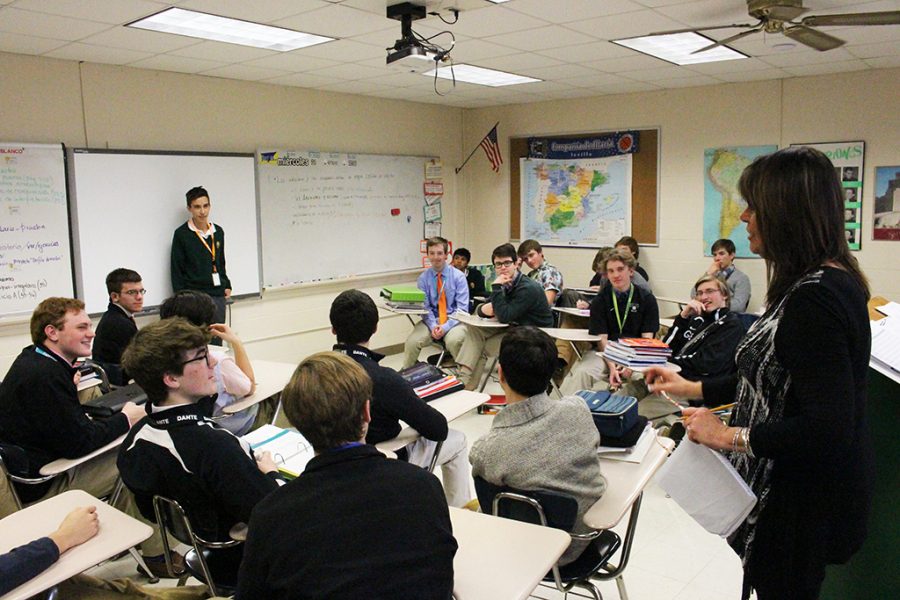Kentucky Needs to Expand Language Requirement
Multiple Benefits to Studying Another Language
Visitors from Argentina exchange ideas with students in one of Ms. Maria Martín’s classes.
January 24, 2020
“She was called Belisa Crepusculario, not by her baptism or on recommendation of her mother, but because she sought the name until she found it. Ever since, the name had adorned her. Her profession was to sell words.”
“Dos palabras,” by Isabella Allende, tells the story of a woman who creates and sells words to people for a living. It shows how the power of language can be utilized to change perspectives, alter minds and create a new world.
But what if we were limited to only one language? In Kentucky the Department of Education does not mandate a foreign language requirement. This needs to be changed immediately.
According to the United States census, Kentucky ranks 47th in educational attainment, with 88 percent of adults having a high school diploma and only 22 percent having a bachelor’s degree.
Furthermore, 7.1 percent of adults in Kentucky who only have a high school diploma are unemployed. Many attribute this to weak public school systems in Kentucky.
Recently, former Kentucky Governor Matt Bevin was a prime target for his attack on the Commonwealth’s public-school funding. While most people agree this problem needs to be addressed, there is no consensus on a solution.
One suggestion is to increase STEM programs for middle schools and high schools. Yet as our culture increasingly moves towards a focus on math and science, one key element is being left to slowly wilt away: an appreciation for other languages.
“No entiendo.” “Je ne comprends pas.” “Ich verstehe nicht.” “I don’t understand.”
Many Americans feel they have no need to learn another language.

Gus Boyer
Contributing Columnist
Ms. Maria Martín teaches world languages at Trinity High School, where two credits are required for graduation. She said, “I think there is a feeling that students ask why take a second language if you can speak English anywhere you go in the world?”
Studying another language yields many benefits. According to Martín, learning a language not only helps with a sense of global connectivity, but with soft skills, such as memorization, public speaking and communication.
Moreover, she said her best students not only achieve an understanding of Spanish; they often are at the top of the class in other subjects.
Languages, of course, also have more pragmatic purposes. Memorization and conceptual skills that develop language learning apply directly to college.
Trinity world languages teacher Mr. Jeff Hurt said, “Whatever field you get into, you will need to learn that vocabulary and the culture of communications in that field; when you are dealing with language, you are working with vocabulary, culture and structure.”
Before teaching at Trinity, Hurt taught at Indiana University Southeast. He said that many of his best students were ones who had a high school experience with a language. What’s more, many universities have a language requirement for honors programs or basic admission.
Typically, institutions of higher learning look for two years and sometimes more. This means that states have an incentive to require students to study another language.
The versatility of any language applies to many other aspects of life, including a view of life’s purposes. Great Spanish literature, while it is a beautiful art form, can teach a reader about one’s journey on earth.
Take the works of 16th-century poet Luis de Argote y Gongora. His 166th sonnet depicts the idea that time is not permanent, promoting the notion of carpe diem. Without the learning of languages, perspectives of the world would be lost to a mono-cultural society.
Translators who attempt to decipher meaning in an original dialect often fail to capture nuance in a work. One chief way to achieve understanding of the world and broader viewpoints is through a foreign language.
As more people realize the importance of this issue, solutions must be found. We can look to other nations to see what programs work for them. In many other countries students are taught at least two languages, with English usually one of them.
For example, Santa Ethnea, an Argentine elementary through high school, totally immerses their students in English while they speak Spanish at home.
Classes in the morning are taught solely in English, and this does not include only grammar or literature. Math, social studies, even psychology, are taught in English. This system proves to be very effective as students can converse in two languages easily by the time they are 12 and have a masterful understanding when they graduate.
Despite budget cuts, world language programs must be given due priority. Like Kentucky, the state of California does not require any foreign language to be taught.
California educators promote the idea that “studying a foreign language completes and improves a student’s education while providing the foundation for further personal enrichment, scholastic achievement, and economic opportunities.”
This state is currently presenting a measure that would influence primary school districts to consider offering foreign language teaching. There is, however, not enough funding for education, and the bill is unlikely to get passed.
The Cali Calmecac Charter School in California is one in which students do not speak English, much like the immersion school in Argentina.
In Gabriel Frayne Jr.’s “A Second Language; Foreign Language Classes Are Scarce in American Schools,” Principal Ginger Dale said Cali Calmecac’s purpose is “to bring Spanish-speaking students together with English-speaking students with the goal of having all the students become bilingual and biliterate and succeed academically and learn cross-cultural understanding.”
In Kentucky, no foreign language is required to graduate, while there are courses for three years of English, three for Science, four for math and four for social studies.
The Kentucky Department of Education should mandate a foreign language requirement of two years to graduate. More students would then be able to meet college admission requirements, increasing the college attendance rate in the Commonwealth.
A disproportionate number of Americans do not have a broad understanding of the outside world. Kentucky can help solve this problem.
Hurt said that Spanish is still relevant in Americans’ everyday lives. Only Mexico has more native speakers of Spanish than the United States, and the numbers are increasing.
Studying any other language has benefits — even Latin, a dead language, can be valuable to further understanding of etymology.
Allende’s protagonist Crepusculario uses her creation of words for good, stopping violence and even soothing a ruthless dictator with only two words. In the story, Allende leaves the mystery of what those two words were to the reader, alluding to the indescribable effect words have on others.
Like Crepusculario, we must utilize the power of as many words as possible.



